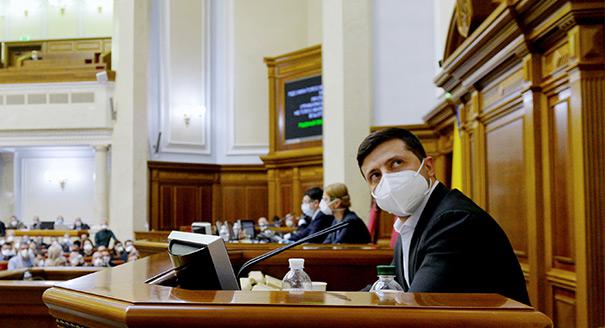Far from being paralyzed by the mass quarantine measures prompted by the new coronavirus epidemic, Ukrainian politics is as action-packed as ever. Last week, the country’s parliament took just a few hours to pass laws that had been fiercely debated for many months and sometimes years. The most significant was a law ending the moratorium on selling agricultural land that had been in place since 2001.
This explosion in legislative activity was largely forced: the president had no other option. Opening up the country’s land market was one of the main conditions of the International Monetary Fund (IMF), whose support is the last hope for the Ukrainian economy as it teeters on the brink of default. For President Volodymyr Zelensky, land reform had become a matter of survival, but the political cost of getting it approved was very high.
More than four months passed between the first and second readings of the controversial land sale bill. In that time, the president’s ratings fell, his party’s majority in parliament began to show cracks, and an economic downturn set in, made worse by the arrival of the coronavirus. The reform, which had originally been conceived as part of Zelensky’s victorious push to transform the country, ended up as a forced response to pressure from external lenders amid universal public opposition.
Land ownership is a sensitive issue in Ukraine because when the collective farm system was dismantled in the late 1990s under President Leonid Kuchma, land was sold off cheaply on a huge scale to big businesses—often headed by former collective farm bosses—with corrupt ties to the government. To end this process, the Ukrainian parliament introduced a moratorium in 2001 on all land transfers except through inheritance.
Since then, corruption has enabled a shadow market to exist. Some of Ukraine’s largest land owners are structures belonging to former president Petro Poroshenko.
Over 4,000 amendments were made to the land reform bill before it was finally passed by parliament in the early hours of March 31, opening up the sale of farmland from July 1, 2021, to Ukrainian nationals, Ukrainian legal entities with no foreign involvement, local communities, and the state. Foreign nationals are banned from owning Ukrainian land until a referendum on the issue can be held.
Getting the land reform bill passed has come at a great political cost for Zelensky. His ratings began to fall from the bill’s first reading in parliament, back in November 2019. At one point the president appeared to face a united front by the opposition, from the pro-Russian parties to the nationalists, unified by their opposition to “selling off the motherland,” though each with their own ideological bent.
Former prime minister Yulia Tymoshenko, seeing a chance to return to big-league politics and become the leader of the protest movement, resigned from her party to join the opposition following the bill’s first reading.
But the main threat to Zelensky came from within his own party. In its first reading, 227 of the 246 deputies from the president’s Servant of the People party voted for the unpopular bill. The party leadership was forced to take disciplinary measures against those who had voted against lifting the moratorium, and two deputies were expelled from the parliamentary faction.
By the second reading, the situation had become even more critical: Zelensky was insisting that the parliament simultaneously pass the land reform bill and an “anti-Kolomoisky” bill, so called because it forbids the return of banks that have been nationalized to their former owners, thereby dashing the oligarch Ihor Kolomoisky’s hopes of regaining ownership of Privatbank, Ukraine’s biggest bank.
The reason for the president’s haste was that both laws were among the main conditions of the IMF for issuing an $8 billion aid package. But an opposition movement with ties to Kolomoisky within Zelensky’s party threatened to torpedo the vote. Sabotage measures included the parliamentary finance committee, which is led by deputies loyal to the influential Kolomoisky, finding itself unable to meet for several days to discuss the law. On the eve of the vote, deputies from Servant of the People received anonymous threats warning: “Governments come and go, but Kolomoisky isn’t going anywhere.”
In the end, both the land reform and banking laws were only passed with support from parties that were until recently Zelensky’s fiercest critics: Poroshenko’s European Solidarity, and the Voice party founded by rock star Svyatoslav Vakarchuk. A total of 206 of the 243 Servant of the People deputies voted for the land reform bill, while just 198 of them voted for the anti-Kolomoisky bill. Since then, deputies have proposed thousands of amendments to the latter, putting the IMF package in jeopardy.
Officially, support for the laws from the other parties should not come as such a surprise. As a major landowner himself, Poroshenko has repeatedly backed the lifting of the moratorium on sales, though he took no action to that end when he was president. In addition, the land reform law was drafted at the recommendation of Ukraine’s Western partners, in whose footsteps both Poroshenko and the Voice party are keen to follow. As for the banking law, Poroshenko and Kolomoisky have a long-running vendetta.
But Poroshenko’s unexpected transformation into some kind of constructive opposition amid the schism in Servant of the People is very dangerous for Zelensky, who has built an image for himself as someone who is there to correct the mistakes of his predecessor. Andriy Portnov, a former deputy head of Viktor Yanukovych’s presidential administration, has accused Zelensky of secretly offering Poroshenko immunity from prosecution on corruption charges in exchange for his party’s votes.
Struggling to hold on to his party’s majority, Zelensky is increasingly forced to take heed of the influential national-patriotic minority in parliament. Zelensky finds himself held hostage by the old elite, from whom he is buying the last chances for reform at the cost of his own political future.
